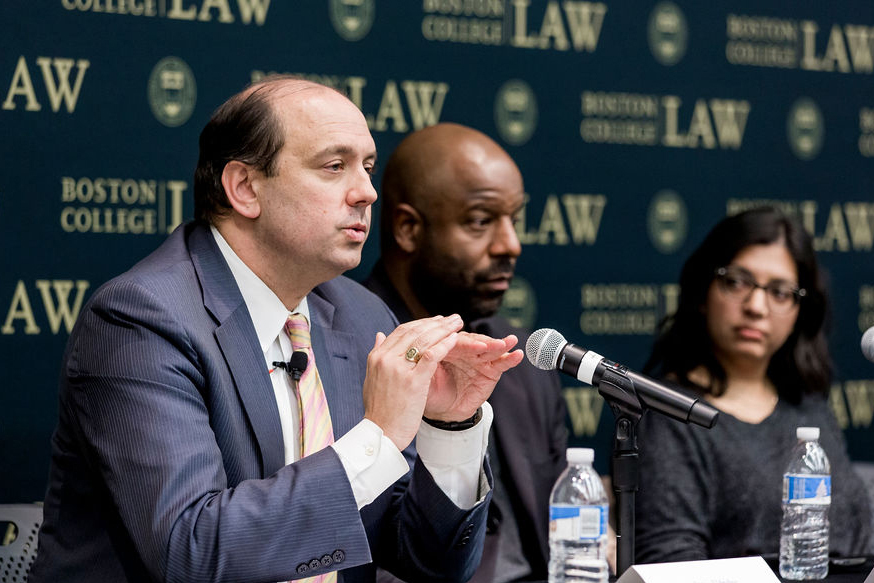The Rappaport Center for Law and Public Policy continued to place a spotlight on issues of equality, inequality, equity, and inequity with its most recent program, “Pot and Parity.”
The program, held on November 1 as part of BC Law’s alumni weekend, focused on the economic and social impacts of cannabis legalization in Massachusetts. The panel brought together Shaleen Title, one of five commissioners on the Cannabis Control Commission and a former cannabis activist; Kobie Evans, the first person to receive a marijuana dispensary license in Boston; and James Eldridge, Democratic state senator for the Massachusetts Middlesex and Worcester district and a 2000 Boston College Law School graduate. Naomi Martin, cannabis reporter from the Boston Globe, served as moderator.
Martin began with a brief history of cannabis policy in Massachusetts. Prior to the legalization of marijuana, which passed as a statewide ballot measure in 2016, criminal laws on cannabis use were “disproportionately racially enforced” in regard to arrest and sentencing, she said. Specifically, racial minorities were three times more likely to be arrested as a result of cannabis use.
When Massachusetts legalized marijuana it was the first state to include a social equity mandate, Martin explained. This means that the state’s cannabis regulatory body, the Cannabis Control Commission, must ensure communities harmed by the war on drugs are able to participate in the lucrative cannabis economy. A key component of the equity mandate is the “empowerment application,” which gives applicants from under-resourced communities preferential treatment when applying for a license to open a dispensary.
Turning to the panelists, Martin asked each to define what successful implementation of statewide cannabis policy would look like.
Title, who advocated fiercely for the 2016 legalization initiative before being appointed to the Cannabis Control Commission, defined success as “the opposite of the school-to-prison pipeline.” In this framing, “communities that have been harmed and overpoliced are the ones that benefit,” she said. Title used the towns of Maynard and Uxbridge as an example of good policy in action. Both locales have shown a “willingness to worry about things besides their own revenue,” granting licenses based on fairness instead of pure financial strength.
Eldridge likewise focused on the role of municipalities in implementing fair policy. He noted that half of the communities in his district currently allow cannabis, and that most of those who have received distribution licenses are wealthy white investors. To achieve success, Eldridge stressed that the state must do a better job of educating municipal officials on the positive impact a cannabis store can have on commerce in a community.
Evans agreed with his co-panelists in the need for fairer policies. Evans is himself an empowerment applicant and is hoping to open two additional dispensaries in the metro Boston area in the next few months.
Focusing on Evans’s proposed store in Dorchester, Martin asked how the community has responded to his plan thus far. He reported that while many residents are supportive, he has faced some resistance. That being said, Evans remarked that it has been difficult to distinguish between residents who simply dislike cannabis and those who are expressing concern due to the potential for increased traffic and a changing neighborhood dynamic.
Title and Eldridge also supported a more robust conversation about the criminal justice component of cannabis legalization. Both mentioned that the state must pass criminal justice reforms to assist in righting past wrongs. For example, the senator stressed that, though politically difficult to achieve, Massachusetts should pass automatic expungement for those who were previously convicted of a cannabis infraction.
Above all, each panelist echoed Evans’s comment that “the [empowerment] program is hamstrung by extenuating circumstances.” Be it municipal resistance, the influence of large cannabis corporations, or the unwillingness of state legislatures to put more protections in place, there was a consensus that Massachusetts has a long way to go before achieving equity in the cannabis industry.
The bright side is that other states have learned from Massachusetts, specifically by strengthening the equity protections pioneered by the state. When asked if there were any plans for reform in Massachusetts, Eldridge replied, “I do think it’s possible.”


